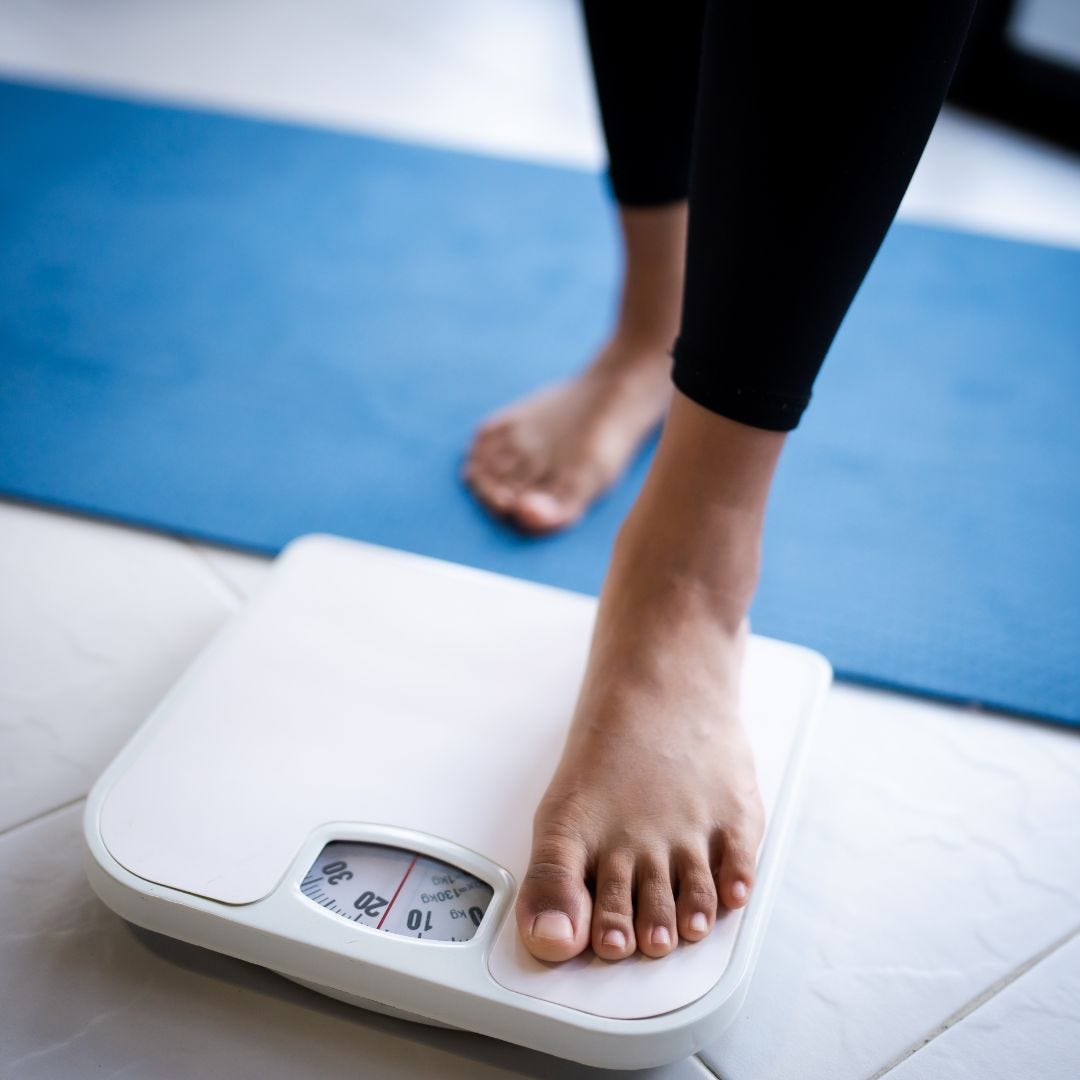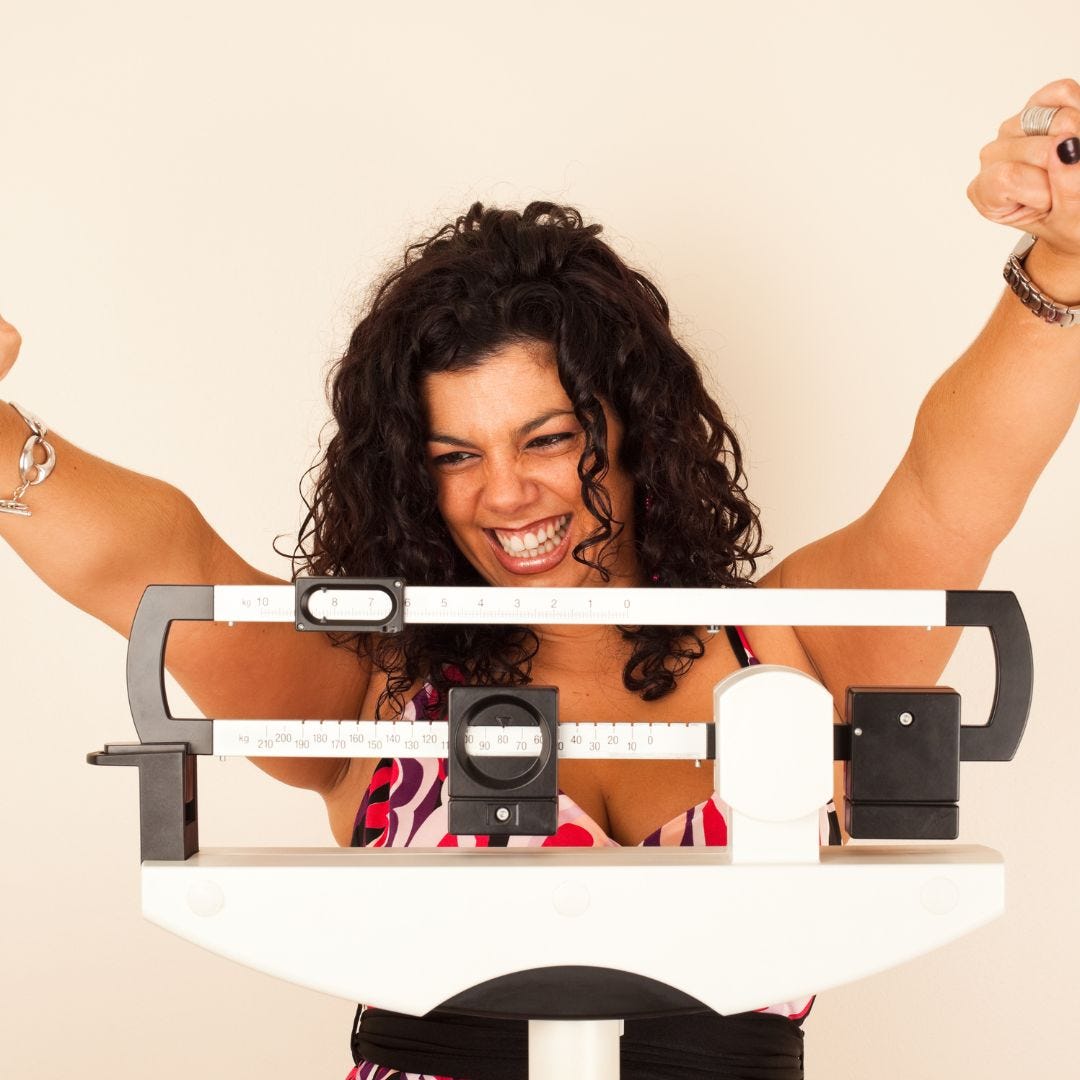If you’re new here—hello, and if you’ve been fanning yourself with us for a while—you know that we are all about bringing you lifestyle research and evidence‑based insights to empower your thriving menopause journey.
This week, we’re wrapping up our June journey through the results of the ME-WEL Project—a collection of research studies that shine a light on the things we won’t hear at our average check-up.
So far this month, we’ve unpacked:
✨ The irony and impact of how menopause and weight loss are framed
✨ The beliefs that influence weight behaviors more than biology alone
✨ The strengths that support a stable weight across the menopause transition
Weight gain is one of the most commonly reported challenges in menopause, with more than two-thirds of midlife women living in larger bodies. It can be a sensitive topic; ironically, thoughts about weight gain can consume us in more unhealthy ways that the weight gain itself. That’s why we have spent this month breaking down the context, nuance and complexity of weight in menopause. We hope that we have opened the door for real, meaningful conversations about weight in menopause and that our readers feel more empowered to adapt, adjust and thrive beyond the number on a scale.
And now? We’re zooming way out. This final ME-WEL study looked at what actually contributes to weight gain in menopause—and in case you didn’t know, it’s about much more than what’s on your plate or your step count.
Using a mixed-methods approach—that is, combining stats with stories—this research confirmed something we all should know:
There’s no single reason women gain weight during menopause. And it goes way beyond the physical. It’s uniquely personal.
Personal in that our weight reflects a story told by the combination of three powerful forces:
What’s going on inside you (personal)
What you’re doing in response (behavioral)
What life is throwing at you (environmental)
We’ve always known at Changing with the Change that real insight comes from real stories. The ME-WEL researchers just confirmed it: that the stories of our weight has the potential to provide the most powerful understanding and empowerment.
Because weight in menopause doesn’t follow a formula. It follows your life.
In this edition:
Your weight as your story
The three major categories that shape weight gain in menopause
How to change with the (weight) change
Your Weight Tells A Story
As we discussed in Week 1, weight, particularly in menopause, isn’t just about aesthetics. Weight gain in menopause can impact everything from disease risk to emotional well-being, relationships, self-image and identity.
But here’s what the ME-WEL sesearchers discovered—something we’ve long recognized in the Changing with the Change community: there isn’t just one story of menopause and weight. There are individual journeys shaped by the story of three overlapping forces:
Personal
Behavioral
Environmental
And here’s the heart of it: our weight tells that story.
It reflects the convergence of these three categories—your biology and mental state, your habits and responses, and the world you’re living and working in.
And these categories don’t act alone. They influence and amplify one another, often in a continuous feedback loop. For each of us, they uniquely combine to shape our experience with weight gain in menopause, and, in most cases, how we respond to these changes.
Which is why understanding the full picture isn’t just helpful—it’s essential. What story do you want to tell?
The Three Categories of Influence
This study makes one thing clear: weight gain isn’t just about what we eat or how much we move. It’s about the combined influence at the intersection of personal, behavioral and environmental factors. Here are a few examples of factors in each category.
Personal influences/factors = our physical menopausal process (our experience with menopause-related changes), other health conditions, medication (including hormone replacement), and genetics.
Behavioral influences/factors = level of self-care, eating habits (including cravings, binge and emotional eating), changes to eating habits (more frequent, increased appetite or amount of food consumed, more pleasure in eating), changes to other routines (including reduction in physical activity).
Environmental factors = changes in relationships, relationship dynamics or professional life as well as stressful life events (it’s worth noting that this study took place during the COVID-19 pandemic, adding another layer of disruption for participants).
While the study authors further organized these into four dimensions, the important takeaway is that none of these factors operate in silos—they overlap and influence one another. For example, a woman experiencing hot flashes (personal) may lose sleep, increasingly feel the pressure of a high-stress work environment (environmental), and turn to more comfort or emotional eating (behavioral).
It’s also worth remembering: the story our weight tells includes how these factors shape what we think and believe. And that mindset-belief loop directly impacts our weight-related behaviors and outcomes (as observed in our featured ME-WEL study from Week 1).
Takeaways to Remember
No more blaming willpower. By now, you’ve heard it loud and clear: weight in menopause isn’t just about carbs, calories or steps.
No more relying on blanket advice. Real change comes from layering strategies that meet you where you are, with full acknowledgment of the story of your lived context.
Your weight is a reflection of the full, nuanced, often messy mix of what’s happening in your body, your behavior, and your life.
And it isn’t about finding a magic fix—it’s about finding a more honest frame.
The truth? When we understand how weight reflects what we’ve been through and what we’re carrying, we can respond with more compassion and more strategy.
Here’s what to keep in mind as you move forward:
Weight gain is never just one thing.
Menopause weight gain (and weight gain in general) is rarely just about food or exercise. Look at the full context. Honor it. Respect the layers
Personal, behavioral, and environmental factors mingle.
Personal, behavioral, and environmental influences mix, match, and magnify each other. The good news is this means one small shift—like better boundaries, sleep, or support—can spark big change.
That number on the scale? It’s not a verdict, it’s a signal.
Your weight is your body’s way of telling a story—of what you’ve been navigating, managing, and surviving. Let it guide your next move, not define your worth.
As we shared at the start of this series, when we talk about menopause and weight, we’re not just talking about numbers. There is a much deeper why that matters more than "Menopause Weight Loss" or gain. We’re talking about your vitality, your longevity, your day-to-day joy.
This is not about chasing a smaller dress size. It’s about showing up for your one precious, powerful body with strategy and care.
Because life doesn’t pause for our wellness goals. It throws curveballs, stressors, and shifts our way. Weight gain in menopause is often the sum of all that: who we are physically, our health habits, environmental demands, mindset and beliefs, and, through menopause, the slow-burning accumulation of change.
As coaches, we’re taught to honor both the science and the stories equally. That’s exactly what the ME-WEL research did. And that’s exactly what HOT FLASH! The Newsletter and the Changing with the Change (CWC) coaching program aim to do: give you context, clarity, and community as you adapt, adjust and redefine what thriving in menopause looks like—on your terms.
Share this with someone who needs to hear it. We are here for you!
📬 Drop us a line if something you read helped you feel more seen. Your voice fuels the HOT FLASH! The Newsletter community.









